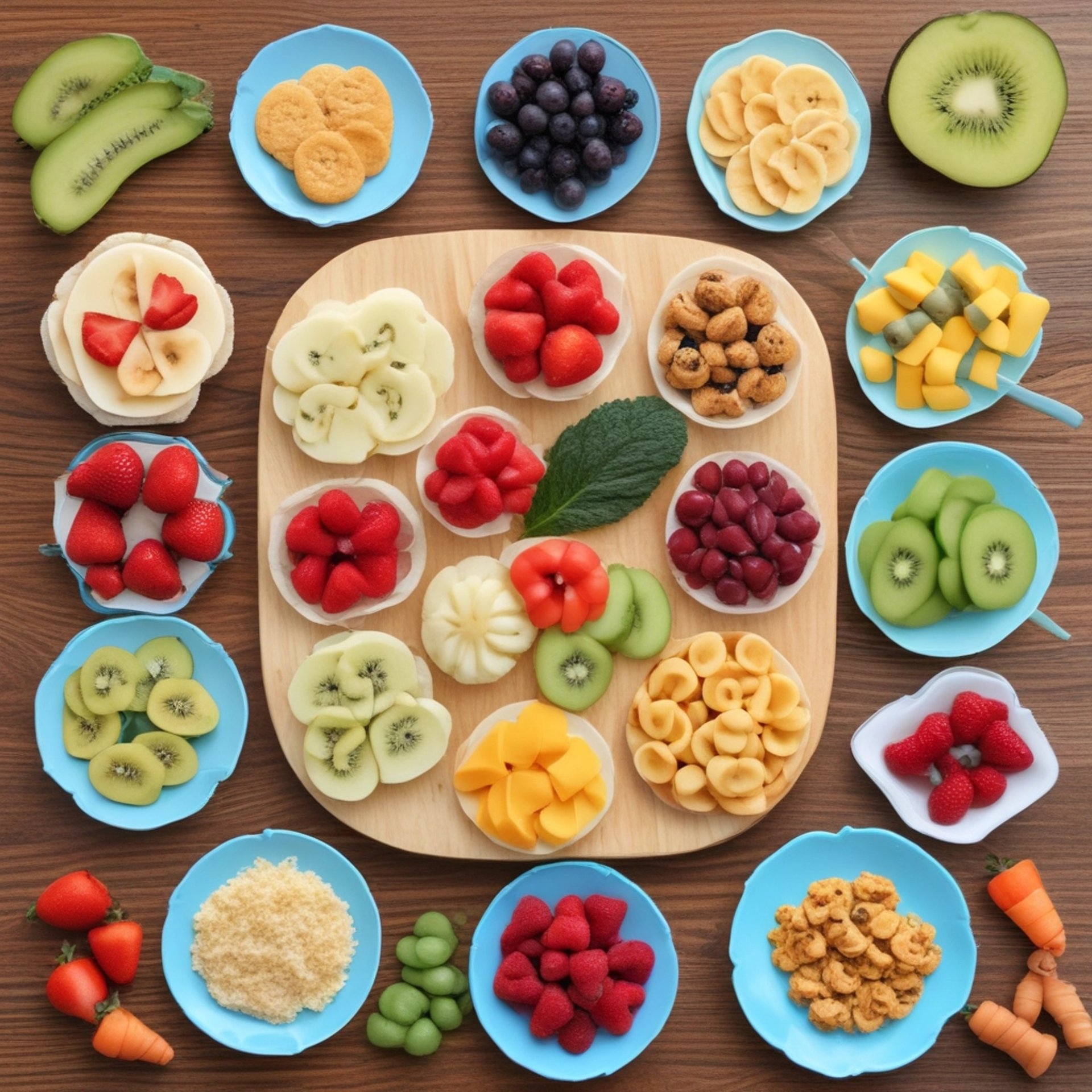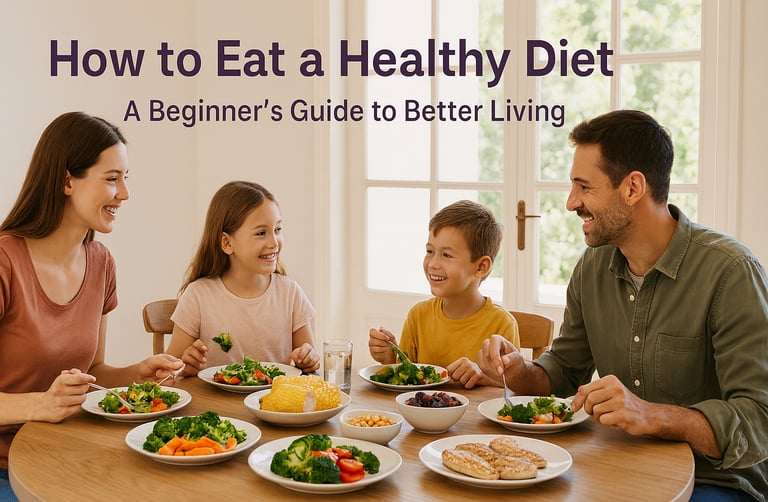
Here are your gut-friendly breakfast ideas


How to Eat a Healthy Diet: A Beginner’s Guide to Better Living
In today’s fast-paced world, more people are finally realizing the importance of eating a healthy diet. After years of relying on fast food, processed snacks, and microwave meals, the shift toward nutrient-rich meals and home cooking is gaining momentum. And for good reason—what you eat directly affects your energy levels, immune system, mental clarity, and long-term health.
For many families, cooking has become a lost art. Busy schedules, convenience culture, and lack of nutrition education have made it easier to grab a burger than to prepare a balanced meal. But here’s the truth: eating healthy doesn’t have to be complicated, expensive, or time-consuming. It starts with small, intentional changes that build into sustainable habits.
## 🧠 Why a Healthy Diet Matters
A healthy diet is essential for maintaining a strong body and a sharp mind. It provides the vitamins, minerals, and macronutrients your body needs to function optimally. While supplements can help fill gaps, they should never replace real food. Whole foods contain synergistic nutrients that work together in ways pills simply can’t replicate.
Eating a balanced diet can help:
- Boost your immune system
- Improve digestion and gut health
- Support weight management
- Enhance mood and mental focus
- Reduce the risk of chronic diseases like diabetes, hypertension, and heart disease
## 🍽️ Healthy Eating Tips for Beginners
If you’re ready to change the way you eat, start with these practical steps:
### 1. Prioritize Whole Foods
Choose fresh fruits, vegetables, whole grains, lean proteins, and healthy fats. These foods are rich in fiber, antioxidants, and essential nutrients.
### 2. Limit Processed Foods
Cut back on items high in sugar, sodium, and artificial additives. Think chips, sodas, instant noodles, and frozen dinners.
### 3. Cook at Home More Often
You don’t need to be a gourmet chef. Start with simple recipes like grilled chicken, stir-fried veggies, or overnight oats. Cooking at home gives you control over ingredients and portion sizes.
### 4. Stay Hydrated
Drink plenty of water throughout the day. Avoid sugary drinks and excessive caffeine, which can dehydrate you and spike your blood sugar.
### 5. Practice Mindful Eating
Slow down during meals. Chew thoroughly, savor flavors, and listen to your body’s hunger and fullness cues.
### 6. Plan Your Meals
Meal prepping helps you avoid impulsive eating and ensures you always have healthy options on hand. Use a weekly planner or apps to organize your grocery list and recipes.
## 🥦 Learning to Cook: A Lifelong Skill
You don’t have to master the kitchen overnight. Start by learning one new recipe each week. Explore healthy cooking channels on YouTube, follow food bloggers, or join online communities that share easy, budget-friendly meals. Over time, you’ll build confidence and discover dishes that you genuinely enjoy.
Cooking can also become a bonding activity with family or friends. Involving loved ones in meal prep makes healthy eating more fun and sustainable.
## ⚠️ Disclaimer
This article is for informational purposes only and does not constitute medical advice. Always consult with a healthcare professional before making significant changes to your diet, especially if you have existing health conditions or dietary restrictions.
## 🌐 Ready to Upgrade Your Lifestyle?
Eating healthy is one of the most powerful decisions you can make for your body and mind. For more healthy eating tips please visit: Hepatoburn.


Healthy Eating Plan: Your First Step Toward Sustainable Weight Loss
Making the decision to follow a healthy eating plan is a powerful first step toward transforming your health and lifestyle. Whether you're aiming to shed a few pounds or tackle a more significant weight loss goal, adopting a balanced and mindful approach to food can make all the difference.
As you reflect on your current eating habits and overall wellness, you may realize that your weight has crept up over time. Perhaps the number on the scale feels overwhelming, and the journey ahead seems like a steep mountain to climb. But here’s the truth: every long journey begins with a single, intentional step—and choosing a healthy eating plan is one of the most impactful steps you can take.
## ?? Understanding the Challenge
Weight gain doesn’t happen overnight, and neither does weight loss. Most people who are overweight don’t maintain a stable weight—they tend to gain more over time if habits remain unchanged. That’s why it’s crucial to recognize the moment you’re in right now: a turning point. How you respond today can determine whether you move toward better health or continue down a path of imbalance.
The reality is, losing weight naturally and sustainably takes time. If you’re aiming to lose weight through a healthy eating plan, expect to shed about 1 to 2 pounds per week. This may seem slow, but it’s the safest and most effective way to achieve long-term results without compromising your health.
## ?? What Is a Healthy Eating Plan?
A healthy eating plan is not a crash diet or a temporary fix. It’s a lifestyle approach that focuses on nourishing your body with whole, nutrient-dense foods. Here are the key components:
- Balanced Macronutrients: Include lean proteins, complex carbohydrates, and healthy fats in every meal.
- Portion Control: Learn to recognize hunger cues and avoid overeating, even with healthy foods.
- Hydration: Drink plenty of water throughout the day to support digestion and metabolism.
- Whole Foods First: Prioritize fruits, vegetables, whole grains, legumes, and lean meats over processed items.
- Mindful Eating: Slow down, savor your meals, and avoid distractions while eating.
## ?? How to Lose Weight Naturally with a Healthy Eating Plan
Here are some practical tips to help you stay on track:
1. Start with a Food Journal: Track what you eat for a week to identify patterns and areas for improvement.
2. Plan Your Meals: Meal prepping helps you avoid impulsive eating and stick to your goals.
3. Limit Added Sugars and Refined Carbs: These contribute to weight gain and energy crashes.
4. Eat More Fiber: Fiber-rich foods like berries, oats, and leafy greens keep you full longer.
5. Don’t Skip Meals: Skipping meals can slow your metabolism and lead to overeating later.
## ?? The Power of Consistency
The key to success is consistency, not perfection. You don’t need to follow a flawless diet to see results—you just need to stay committed to making better choices most of the time. Celebrate small victories, like choosing water over soda or cooking a healthy dinner instead of ordering fast food. These daily wins add up.
## ?? Disclaimer
This article is for informational purposes only and does not constitute medical advice. Always consult with a healthcare professional before starting any weight loss program or making significant changes to your diet, especially if you have underlying health conditions.
## ?? Ready to Take the Next Step?
Your journey to better health starts now. Here is a cutting-edge herbal remedy with 6 natural powerhouse ingredients to promote mitochondrial health, boost energy, and elevate your vitality—naturally and effectively, especially as you age.




Email Us
nichemaster@nichesphere.net
supportservices@nichesphere.net
© 2025. All rights reserved. https://nichesphere.net